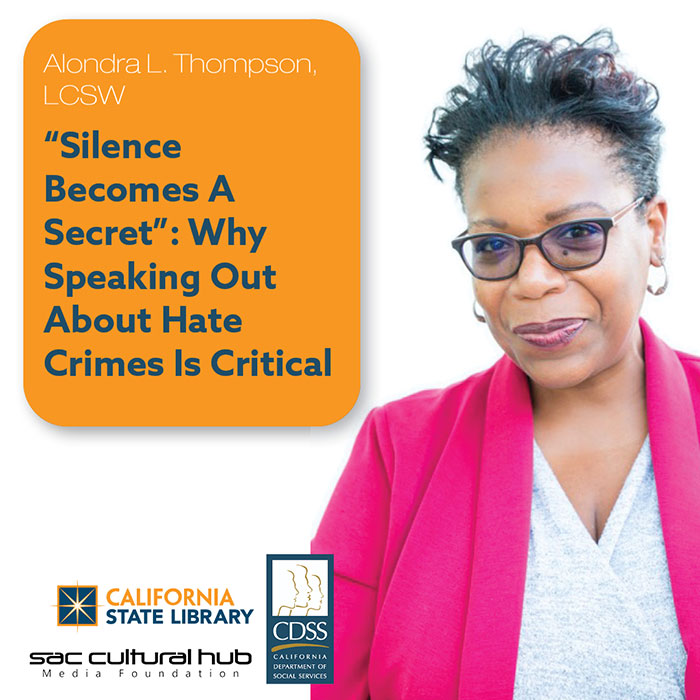
“Silence Becomes A Secret”: Why Speaking Out About Hate Crimes Is Critical
The new feature film, “Till,” masterfully shines a light on one of the most infamous race-based hate crimes. Sadly, we’re still experiencing and talking about race-based hate crimes in 2022.
By Michael P Coleman, freelance writer
The excellent new feature film, “Till,” details the story of Mamie Till Mobley, the mother of Emmett Till, a 14-year-old boy who fell victim to the most infamous race-based lynching of the 20th century. Brilliantly directed by Chinonye Chukwu, “Till” walks viewers through Emmett’s fateful trip from Chicago to Mississippi during the summer of 1955.
Students of history know that Emmett never makes it back home. As such, Chukwu deftly doesn’t detail Emmett’s well-documented kidnapping, torture, and murder. The viewer’s inroad into this story is through the eyes of Emmett’s mother, a woman strong enough to stand up against the oppressive patriarchy and racism of mid-20th century America, look her son’s killers in the eye, and demand justice for Emmett.
“Oscar-worthy” seems insufficient when describing the new film. Actress Danielle Deadwyler, in the title role, undoubtedly deserves an Academy Award nomination, as do most of her co-stars. Chukwu deserves a Best Director nod.
But “Till” is so much more than any accolades that awards season may bring. Every American should see it, as the movie has the potential to change our world…or, at the very least, change the way we see it.
And if you doubt whether the topic is still relevant today, almost 70 years later, consider this: the Emmett Till Antilynching Act was signed into law on March 29, 2022 by President Joe Biden, who was born in 1940…the year before Emmett was born.
My viewing of “Till” prompted me to ponder about the mental health benefits of speaking out on race-based hate crimes, even when most of them, in 2022, aren’t nearly as heinous as Emmett’s. I decided that pondering wasn’t enough, so I reached out to an expert on trauma and mental health.
“You really have to face the fear of how the system may or may not be for you,” said Alondra L. Thompson, LCSW. “There’s often a lot of anxiety that follows that, because the thought process changes. Often, [victims of hate crimes] have to process and work around what they thought was real, or what they thought our world was like.”
I asked Thompson about the best ways in which caregivers, those family and friends who surround and support victims of hate crimes, can best support the victim. As I asked the question, I thought about Emmett’s mom. If I’d been in her circle, I wouldn’t have known how to most effectively support her.
“We always want to feel safe,” Thompson said. “When we feel so unsafe from our external environment, when people assault us and attack us, it’s always important for friends and family to express the love and support that is truly there.”
“Victims sometimes feel like they have nothing, like everything has been stripped away,” Thompson continued. “But the confirmation from family and friends that support is there, and helping the victim see their own resilience base, is critical. The love from family and friends can help the victim realize that despite the trauma, they have survived, through situations that have brought others down.”
“That’s resilience, and that’s to be acknowledged and celebrated, and will help the victim get back up again.”
Thompson and I talked about the many reasons victims of hate crimes of any type often are reticent about coming forward and sharing their stories, whether during talk therapy sessions or in public. She told me the stigma that still persists around mental health is paramount.
“I think we need mental wellness brokers who can go into communities of color and talk about treatment and what it means, and support the resilience of the individual,” Thompson said. “I want to have conversations within our community about stigma, and the reasons why mental illness is as important as diabetes or any other ailment that needs to be addressed.”
“When I’m talking with family members who aren’t about counseling — ‘That’s not something I do’ and ‘I’ll just go to church and pray it away’ are among the things they say — I ask them to share what their typical healing environment looks like. I assure them that that’s the same type of arena that’s provided when someone seeks a professional mental health provider,” Thompson continued. “People need to get out of the mindset that therapy is just sitting on a couch talking to someone across from you. In therapy, you’re free to speak and seek what you need.”
“Today, things are different than they were back in the day with regard to stigma around mental health,” Thompson said. “Today, counseling and therapy is a part of the fad! ‘I have a counselor.’ ‘I’m seeing somebody.’ It’s a different message. I think we’re looking at the older community that still sees therapy as a ‘crazy person’ thing, but that’s changing. I’m seeing more teenagers and younger people, and more older people are coming in, so I know the stigma is not as strong as it was back in our day. But it’s still there.”
According to Thompson, the deafening silence about trauma, like the kind that victims of hate crimes face, has to be overcome.
“Silence becomes a secret, Thompson said. “You start to identify with the secret, and it becomes the normal, because it’s not openly discussed. And because of that, it starts to become who you are. You start to see it — the trauma — as normal, and you don’t get the opportunity to discover that it’s not normal, that it’s not who you are, or to position yourself to receive treatment to address [the trauma].
“It should never become your norm,” Thompson said of the trauma that accompanies race-based hate crimes. “You have to talk about it. And when you do, you realize that there are other individuals who’ve dealt with the same situation, and that some of them can suggest ways of coping with what has traumatized you.”
“Tell your story! You can’t let your trauma be you!”
“Till” is in theaters and available on-demand and on streaming services now.
Michael P Coleman is a Detroit-born, Sacramento-based freelance writer, podcast and video producer and host, and content creator. Connect with him at MichaelPColeman.com.
From now thru June 2022 we will publish news stories in THE HUB Magazine as well as release videos on all Sac Cultural Hub social media platforms with a series of articles focusing on recognizing hate crimes among communities of color throughout California with thought-provoking interviews. If you are of African descent (Black / African American) living in California, and you have survived a hate crime or incident, or you are a family member of someone who lost their life to a hate crime, and would like to share your story or testimony with THE HUB, e-mail contact@sacculturalhub.com or call 916-234-3589. With your help, THE HUB can attempt to be apart of solutions that heal the community while forging ahead to stop the hate. Thank you!
The Stop The Hate campaign is made possible with funding from the California State Library (CSL) in partnership with the California Commission on Asian and Pacific Islander American Affairs (CAPIAA). The views expressed on this website and other materials produced by Sac Cultural Hub Media Foundation do not necessarily reflect the official policies of the CSL, CAPIAA or the California government. Learn more about the Stop The Hate campaign at: https://capiaa.ca.gov/stop-the-hate/





